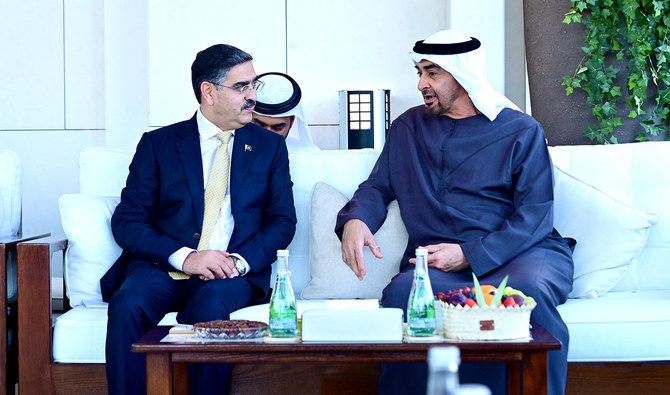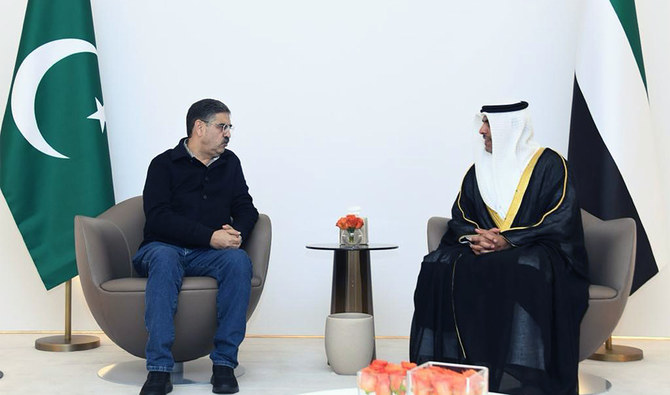ISLAMABAD: Pakistan has signed multi-billion-dollar memorandums of understanding (MoUs) with the United Arab Emirates (UAE) across diverse sectors, Prime Minister Anwaar-ul-Haq Kakar said on Monday, during his visit to the Gulf nation.
PM Kakar arrived in the UAE on Sunday on a bilateral visit until Nov. 28, aimed at sign multiple investment and cooperation agreements, according to the Pakistani foreign office.
He will subsequently embark on a two-day visit to Kuwait, which will conclude on Nov. 30.
“Today in Abu Dhabi, multi-billion-dollar MoUs were signed between Pakistan and the UAE, spanning various sectors,” Kakar said in televised comments Monday night.
“This marks a new era of economic cooperation, regional stability, and strategic collaboration between Pakistan and the UAE.”
The prime minister congratulated the people of both nations, saying the friendship initiated by Sheikh Zayed in the 1970s had now entered a new phase under the leadership of UAE President Sheikh Mohamed bin Zayed Al-Nahyan.
“These tangible projects will have a significantly positive economic impact on the Pakistani economy in the days to come,” Kakar added.
The development came after a meeting between PM Kakar and the UAE president in Abu Dhabi.
“During the meeting, regional and global developments were also discussed with particular reference to the deteriorating human rights and humanitarian situation in the occupied Palestine,” PM Kakar’s office said.
“The Prime Minister expressed Pakistan’s support to a just and durable solution of the Palestinian question anchored in international law and in line with relevant United Nations and OIC resolutions.”
The two leaders reaffirmed the resolve to further strengthen bilateral strategic cooperation and dialogue between Pakistan and the UAE.
They witnessed signing of the MoUs between Pakistan and the UAE, relating to energy, port operations projects, waste water treatment, food security, logistics, minerals, and banking and financial services sectors.
“These MoUs will unlock multi-billion dollars of investment from United Arab Emirates into Pakistan and will help realize various initiatives envisioned under [Pakistan’s] Special Investment Facilitation Council,” the statement read.
Pakistan and the UAE are close allies. The Gulf nation is Pakistan’s third-largest trade partner after China and the United States. It is also viewed as an ideal export destination by policymakers in the South Asian country due to its geographical proximity with Pakistan.
The UAE is also home to an estimated 1.8 million Pakistani expatriates and, after Saudi Arabia, is the second-largest source of remittances for the South Asian nation of more than 240 million.
During the meeting with President Sheikh Mohamed, PM Kakar expressed his profound gratitude for the UAE’s firm support to Pakistan in economic and financial domain.
“The prime minister reiterated Pakistan’s full support to the UAE’s Presidency for COP 28, underlining its importance as an opportunity for meaningful progress toward effective and result-oriented global actions in key areas to mitigate climate impact, including establishment of the Loss and Damage Fund,” his office said further.
PM Kakar is slated to attend the 2023 United Nations Climate Change Conference (COP28) in Dubai on December 1-2.
On his visit to Kuwait, the prime minster will meet Crown Prince Sheikh Meshal Al-Jaber Al-Sabah and Prime Minister Sheikh Ahmed Nawaf Al-Ahmed Al-Sabah, the Pakistani foreign office said in a statement.
“The visit will include signing of various MoUs in the field of Manpower, Information Technology, Mineral exploration and Food Security, Energy and Defense,” the statement read.
Speaking to Arab News, Mumtaz Zahra Baloch, a Pakistani foreign office spokeswoman, said PM Kakar would participate in the World Climate Action Summit, scheduled to take place in Dubai on Dec. 1-2 as part of COP28, following the Kuwait visit.
“Prime Minister Kakar’s program in Dubai includes participation in high-level events at the summit and bilateral meetings with counterparts from participating countries,” she said. “He will underline the centrality in the climate change debate of the established principles of equity and common but differentiated responsibilities.”
At COP27 in Egypt last year, Pakistan led negotiators from developing countries to a breakthrough deal to create a “loss and damage” fund, overcoming years of resistance from wealthy nations. But since the summit, governments have struggled to reach a consensus on the details of the fund, such as who will pay and where the fund will be located.
A special UN committee tasked with implementing the fund met for a fifth time in Abu Dhabi earlier this month, following a deadlock in Egypt last month, to finalize recommendations that will be put to governments when they meet in Dubai next week. The goal is to get the fund up and running by 2024.
At COP28, Baloch said Pakistan would work with other developing countries and seek operationalization of the loss and damage fund for all climate-vulnerable developing countries as well as a meaningful outcome of the first Global Stocktake (GST), a two-year process scheduled to happen every five years, to coordinate efforts on climate action, including measures to bridge gaps in progress.
The first Global Stocktake got under way in 2022 and will conclude at COP28. The next Stocktake will occur in 2028 and again in 2033.
“Pakistan will also reiterate its call for the developed countries to urgently and fully deliver on the long overdue goal of mobilizing $100 billion per year as climate finance for developing countries,” Baloch added.



















